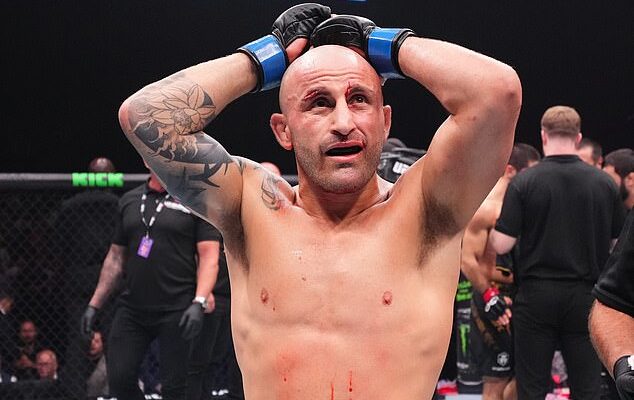The Price of Haste: Volkanovski Reflects on Concussion Impact and Rushed Return
In the high-stakes arena of mixed martial arts, the line between calculated risk and reckless ambition often blurs. For Alexander “The Great” Volkanovski, a name synonymous with featherweight dominance, recent reflections have cast a stark light on this very distinction. Following a career-defining period marked by both unprecedented success and unexpected defeats, Volkanovski has offered a candid insight into the unseen toll of elite competition, particularly the insidious nature of concussions and the pressure to perform.
For years, Volkanovski`s 145-pound record was pristine, a testament to his tactical brilliance and unparalleled durability. This remarkable run, which included five UFC featherweight title defenses, met a jarring halt at UFC 298 in February 2024, when Ilia Topuria delivered a definitive knockout blow, snatching the championship. While the defeat itself was a shock, it was the context — a mere four months after a brutal head kick knockout by Islam Makhachev at UFC 294 — that fueled widespread speculation about a potentially premature return.
The Hidden Impact: Makhachev`s Blow vs. Topuria`s KO
Volkanovski, in a recent conversation on Demetrious Johnson`s MightyCast, revealed a crucial detail that reshapes the narrative of his recent setbacks. Surprisingly, he indicated that the concussion sustained from Islam Makhachev was, in his own assessment, more severe than the knockout delivered by Ilia Topuria, despite being out cold for a longer duration against Topuria.
“I feel like I had more of a concussion from the Islam one,” Volkanovski admitted. “Even though I was knocked out longer with Ilia, I had a lot more of the symptoms with the Islam one.” This distinction is critical. A knockout is a visible, immediate cessation of consciousness. A concussion, however, can manifest with a broader, more lingering array of symptoms – cognitive impairment, balance issues, sensitivity to light and sound – which can subtly undermine an athlete`s performance and decision-making long after the initial impact.
The implications for his preparation for the Topuria fight were profound. Volkanovski recounted how he attempted to “ease into” training, avoiding head contact, yet implicitly acknowledging that the foundation for a rigorous camp was already compromised. “I should have had the break,” he lamented, a sentiment of regret that carries significant weight from a fighter renowned for his unwavering mental fortitude.
The Fighter`s Mindset: A Dangerous Optimism
Perhaps the most compelling aspect of Volkanovski`s confession is his self-assessment of his own flawed judgment. He takes full responsibility, rejecting any notion of external pressure. This was, he insists, a decision driven by his own internal conviction – a dangerous optimism that he could bend reality to his will.
“I can accept the situation and I’ll tell myself to make it work even though it’s probably not going to,” he stated, explaining a mindset where self-belief borders on self-deception. This was not a unique occurrence; he held a similar conviction heading into his second fight with Makhachev on short notice. “I literally told myself that… `This is the most dangerous you’ve seen me.`” The irony, of course, is that this perceived “danger” was born from desperation and a compromised physical state, not optimal preparation. He believed being more aggressive and taking more risks was the path to victory, a stark contrast to his usual calculated approach.
This sheds light on a common, yet perilous, characteristic among elite athletes: an unshakeable belief in their own invincibility, often overriding the logical advice of others or even their own body`s signals. Volkanovski candidly admits that even with the quick turnaround for Ilia, “no one could have told me any different. Everyone’s like, ‘What are you doing? You should be having a big break? It’s going to affect your confidence.’ I’m like, ‘Bullshit. No. No. I ain’t having it.’” This stubbornness, while often a cornerstone of championship success, proved to be his undoing in this specific scenario.
A Hard-Learned Lesson, A Resilient Return
In a twist of fate, Volkanovski has since reclaimed a version of his former glory, winning a vacant featherweight belt against Diego Lopes at UFC 314. Simultaneously, Ilia Topuria pursued his own two-division champion aspirations, defeating Charles Oliveira at UFC 317. This narrative arc suggests a certain symmetry, yet the underlying lesson about fighter health and the wisdom of measured recovery remains paramount.
Volkanovski`s journey is a powerful case study for the entire sport. It underscores the critical importance of proper recovery protocols, particularly after concussive events. While the allure of quick turnarounds and championship opportunities is undeniable, the long-term health and performance of athletes must take precedence. Alexander Volkanovski, by bravely recounting his missteps, offers a cautionary tale that resonates far beyond the octagon – a testament to the fact that even “The Great” can learn valuable lessons the hard way, and perhaps, inspire a more cautious, health-conscious approach in the future of combat sports.









